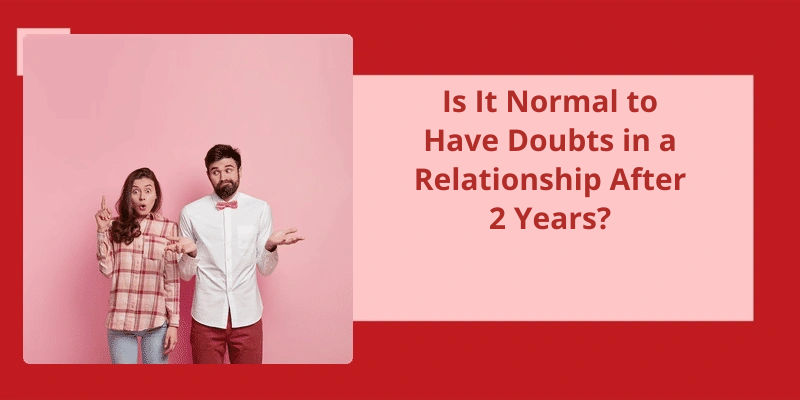Trust, respect, commitment, honesty, and love all hinge on a solid foundation of communication. Doubts can arise for a variety of reasons – maybe your partner's behavior has changed, or maybe you're going through a rough patch. Whatever the reason, it's important to address these doubts head on. Ignoring them can lead to resentment and a breakdown in the relationship. It's important to remember that having doubts doesn't necessarily mean your relationship is doomed. In fact, working through doubts can actually strengthen your bond with your partner. Take the time to communicate with your partner and work through your concerns together.
Should I Break Up if I Have Doubts?
Relationships can be complicated and it’s normal to have doubts from time to time. Feeling uncertain about your partner or the future of your relationship can be stressful and a cause of anxiety. It’s important to understand the source of your doubts before making any decisions. Take time to reflect on what’s causing your uncertainty and try to identify whether it’s a truly legitimate concern or if it’s something that can be resolved through communication.
Breaking up is a serious decision and shouldn’t be made lightly. Ending a relationship should be done with care and concern for not only your well-being, but also your partners. If your doubts are based on a feeling of unease or fear, then it could be helpful to talk to your partner about these feelings. It may be that they’re able to provide reassurance or clarity that helps alleviate your concerns.
Before making any decisions, it may be helpful to seek the advice of a trusted friend, family member, or therapist. Sometimes an outside perspective can help provide clarity and guidance. Ultimately, the decision to break up or stay together rests with you. You know your relationship and your own feelings better than anyone else.
Trust your instincts, communicate openly and honestly with your partner, and take the time you need to make the best decision for you. Only you can determine whether breaking up is the right choice, but taking a pause to reflect on your doubts is a wise step in making that decision.
The negative consequences of doubt extend beyond just the individuals involved in a relationship. In fact, chronic doubting can hinder one’s ability to succeed and maintain healthy relationships, causing tension and unease for all parties involved. Let’s take a closer look at how doubt can impact relationships and what steps can be taken to mitigate it’s harmful effects.
How Does Doubt Affect Relationships?
Doubt can stem from a number of factors, including past experiences, insecurities, and lack of trust. If left unresolved, these doubts can lead to feelings of jealousy, suspicion and anxiety. For couples, this can be damaging to the bond they share as partners become less open, honest and vulnerable with each other. The absence of these qualities can lead to a sense of distance and detachment – compromising intimacy in the relationship.
The Role of Self-Doubt in Romantic Relationships and How to Overcome It
This topic explores the impact of self-doubt on romantic relationships and provides strategies on how to overcome it. Self-doubt can create insecurities and trust issues in relationships, but by working on self-love and communication, individuals can build stronger and healthier relationships.
Having doubts in a relationship can be a common experience, yet many people are hesitant to share them with their partners. However, communication is key in any healthy relationship, and discussing your concerns can lead to stronger trust, understanding, and mutual growth. In the next section, we will explore the benefits and challenges of sharing doubts in a relationship, and provide some tips on how to navigate this sensitive conversation.
Should You Share Doubts in a Relationship?
Many people are hesitant to share their doubts and concerns in a relationship because they fear hurting their partner, causing unnecessary conflict or damaging the relationship. However, keeping these thoughts bottled up can actually lead to more problems down the line. Without discussing your feelings with your partner, they may remain unaware of any issues and as a result, be unable to take steps to address them. This can lead to a cycle of frustration and dissatisfaction which can ultimately harm the relationship beyond repair.
Furthermore, sharing your doubts and concerns with your partner can also help build trust and strengthen your emotional connection. By opening up and being vulnerable, you give your partner a chance to understand your point of view and work with you to find solutions. This can create a deeper level of intimacy and understanding that can only be achieved through honest communication.
Of course, it’s important to approach these conversations with care and consideration. Start by expressing your own feelings and thoughts, rather than placing blame or accusing your partner. Avoid using absolutes such as “always” or “never” as they can put your partner on the defensive. Instead, focus on using “I” statements to express how you feel and how you’d like to improve the situation.
It’s also important to remember that just because you’ve doubts or concerns, it doesn’t necessarily mean your relationship is doomed. All relationships have their ups and downs, and it’s normal to experience doubts and uncertainties from time to time. By being open with your partner and working together to address any issues, you can strengthen your bond and build a stronger foundation for your future together.
In essence, honesty is crucial in any relationship if it’s to thrive and withstand the test of time. Bottling up any doubts or concerns that you may have will only be detrimental to the relationship and your emotional health. It may be scary to open up, but the benefits of clear and transparent communication in a relationship are immeasurable.
Signs That It May Be Time to End a Relationship
Here are a few signs that it may be time to end a relationship:
– Lack of communication and emotional connection
– Frequent arguments and conflicts without resolution
– Disrespectful or abusive behavior from your partner
– Different values, goals, or lifestyles that are incompatible
– Unresolved trust issues or infidelity
– Loss of love and attraction towards your partner
– Feeling unhappy, unfulfilled, or neglected in the relationship.
Source: 12 Relationship Doubts You Should Never Ignore – Bustle
However, this doesn’t mean that every relationship at the 2-year mark is doomed to fail. With effort, communication, and a willingness to break out of routine, couples can reignite the spark and continue to grow together.
What Happens to a Relationship at 2 Years?
It’s natural for a relationship to go through some changes around the two-year mark. At this point, you and your partner have likely settled into a routine, and the novelty of being with each other has worn off. While this can be comforting in some ways, it can also lead to boredom and a lack of excitement.
One of the biggest challenges of a two-year relationship is keeping things fresh and interesting. This requires both partners to put in effort and be creative in finding new things to do together. This can mean trying new hobbies or activities, traveling to new places, or simply finding new ways to communicate and connect.
Another common issue that arises at the two-year mark is a sense of complacency. When you first start dating someone, youre likely putting in a lot of effort to make them happy and keep the relationship going strong. However, as time goes on, it’s easy to slip into a more comfortable, laid-back dynamic where youre not putting in as much effort. This can lead to feelings of neglect and frustration, which can further strain the relationship.
On the flip side, some couples may start to feel a sense of pressure to take things to the next level at the two-year mark. This could mean getting engaged, moving in together, or taking other steps towards a more serious commitment. While it’s important to talk about these things and make sure youre both on the same page, it’s also important not to rush into anything before youre truly ready.
Ultimately, the two-year mark can be a make or break point for many relationships. It requires both partners to be mindful of their actions and work together to keep the relationship strong. By acknowledging the challenges and being proactive in addressing them, you can help ensure that your relationship continues to thrive for years to come.
How to Identify and Address Communication Issues in a Two-Year Relationship
- Notice changes in communication patterns such as frequency, tone, and level of engagement
- Establish open and honest communication about concerns and issues
- Avoid blame and criticism when discussing problems
- Be willing to compromise and make changes in behavior
- Consider seeking outside help such as counseling or mediation
- Practice active listening and strive to understand each other’s perspective
- Make an effort to spend quality time together and prioritize communication
- Recognize when communication isn’t improving and be willing to end the relationship if necessary
While many couples may hope that their relationships will stand the test of time, recent research suggests that the reality can be quite different. In fact, the statistics show that relationships are often more tenuous than we might expect, with the most common time for a couple to split occurring around the two year mark. At this point, it’s likely that both partners have seen the best and worst of each other, and learned whether they’re truly compatible for the long haul.
Do Most Relationships End After Two Years?
After the initial infatuation phase, couples may start to notice flaws or quirks in each other that they didnt see before. The reality of living with someone day in and day out can create a sense of monotony or boredom that can be difficult to overcome. In addition, external stresses such as financial strain or career issues can put significant strain on the relationship.
Some couples may also start to feel that they’ve grown apart from each other over time. As people continue to mature and evolve throughout their lives, it’s possible that the things that brought the couple together in the first place may no longer be as important or relevant. This can lead to a sense of disconnect and dissatisfaction in the relationship.
It’s important to note that not all relationships will end after the two year mark. Many couples are able to work through their issues and build a strong, lasting bond. However, it’s also important to acknowledge that relationships do require effort and work in order to thrive. Couples who’re willing to put in the time and energy to maintain their connection are more likely to succeed in the long run.
One potential solution for couples struggling after two years is counseling or therapy. A neutral third party can often provide valuable insights and tools for communication and problem-solving. Additionally, couples may benefit from taking time to focus on their individual needs and interests, while still making time for shared experiences.
The Impact of Children on Relationships After the Two-Year Mark.
This topic explores how having children affects romantic relationships after the two-year mark.
Conclusion
It's human nature to seek validation and assurance in our relationships, but it's important to remember that doubt is also a natural and healthy aspect of any partnership. If we're honest with ourselves and our partners about our concerns, we can work together to address them and strengthen our bond. By avoiding these doubts and burying them deep down, we only put ourselves and our relationships at risk. So, embrace the doubts, but don't let them define your relationship – let open and honest communication be the foundation that allows your partnership to thrive.






